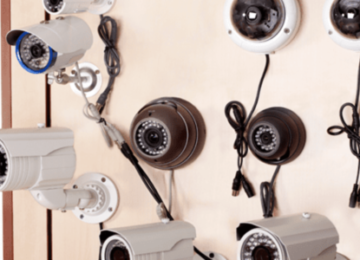Inform employees about the installation of video surveillance: recommendations and sample letter

This is an obligation enshrined in the French Labour Code: employers are obliged to inform their employees of the installation of any video surveillance system. Here are our tips for informing staff about the presence of cameras in the workplace.
How to inform employees of the presence of a video surveillance system
Employers have several ways of informing employees of the presence or forthcoming installation of video surveillance cameras in the workplace. This can be done via:
- signage inside the premises;
- the company intranet;
- the company’s internal rules;
- by post.
Signage inside the premises
This could be an information panel displayed on the company's premises. It must include:
- the name of the company;
- the presence of cameras;
- the one-month retention period for the images, the fact that they may be viewed, and the identity of the persons authorized to do so;
- the fact that all employees have a right of access to their data and can ask for it to be deleted;
- the fact that all employees have the right to object to the processing of their personal data, as well as the right to limit such processing;
- the name of the Data Protection Officer (DPO), or the name of authorized staff within the company;
- contact details for the Data Protection Officer;
- the French Data Protection Act;
- the fact that the images recorded can be viewed by the police if the situation so requires;
- the fact that a complaint can be made to the Commission nationale de l'informatique et des libertés (CNIL).
Providing information via the intranet and internal regulations
The second level of information concerns the intranet and the company's internal regulations. Its objective: to provide more comprehensive information on the General Data Protection Regulation (GDPR), i.e. the management of personal data.
This information may be provided as soon as the employee is recruited, and/or sent to all company staff.
To go even further, the employer may publish its information notice on the company intranet and/or in the company’s internal regulations.
It should be noted that people accessing company premises on an occasional basis (contractors, visitors, customers, etc.) are not entitled to the same rights as employees. must also be informed of the existence of camera(s).
Sample information letter to employees
Employers can also send a standard letter to each of their employees and to the single body of staff representatives to inform them of the installation of cameras in the company. This letter can be sent by registered post. Keep a copy of your letter and the acknowledgment of receipt.
Here is a sample letter:
“Information brought to the attention of XXX employees
Orléans, 25 May 2024
We hereby inform you that our premises are under video surveillance to ensure the safety of people and property.
A camera is installed at the entrance to the building to secure access.
Three other cameras are deployed inside the premises:
- at the lift entrance;
- at the entrance to the managers’ offices;
- in the corridor leading to the break area;
This video surveillance system does not film employees at their workstations or in rest areas.
The person responsible for the footage is Jean-Paul Durand.
Footage is kept for the statutory period.
This system is implemented in compliance with the French Data Protection Act of January 6, 1978, amended by the Act of August 6, 2004 and the Act of January 21, 1995.
The system has been declared to the Commission nationale de l'informatique et des libertés (CNIL).
Sincerely,
Jean-Paul Durand, Managing Director of XXX."
What the law says about video surveillance in companies
The French law on video surveillance in the workplace sets out the framework for the installation of video surveillance in companies.
Video surveillance systems installed in places not open to the public, such as businesses, are subject to the provisions of the French Data Protection Act of 6 January 9, 1978. A declaration to the Commission nationale de l'informatique et des libertés (CNIL) is compulsory.
Everyone working in the company must be informed of the system’s implementation. The purpose of the cameras must be legal and legitimate.
The location of the cameras is not at the discretion of the employer. They can be installed at the entrance and/or exit of a building, but they cannot film the activity of employees when they are at their workstation, with the exception of certain activities (people working in the presence of valuable goods, handling money, etc.). It is also forbidden to film rest areas, toilets, and union premises.
Data will be kept for no longer than one month.
Failure to comply with the legislation will result in criminal penalties.
The difference with AI video surveillance
If the company opts for a video surveillance system using Artificial Intelligence (AI), it is subject to the same obligation to inform its employees. At Veesion, we’ve come up with revolutionary AI-based video surveillance software that can effectively secure any type of business. This technology can, for example, automatically detect theft in real-time. This system, which is particularly well-suited to video surveillance of pharmacies, complies with the legal framework in force (Code de la sécurité intérieure and RGPD).
A project? Do you have a question? Contact us now to discuss the possibilities of installing an Artificial Intelligence video protection system in your company.
The most popular
Related news
Discover what Veesion can do for you. Do you have one or more stores?
Our team will contact you within 48 hours





